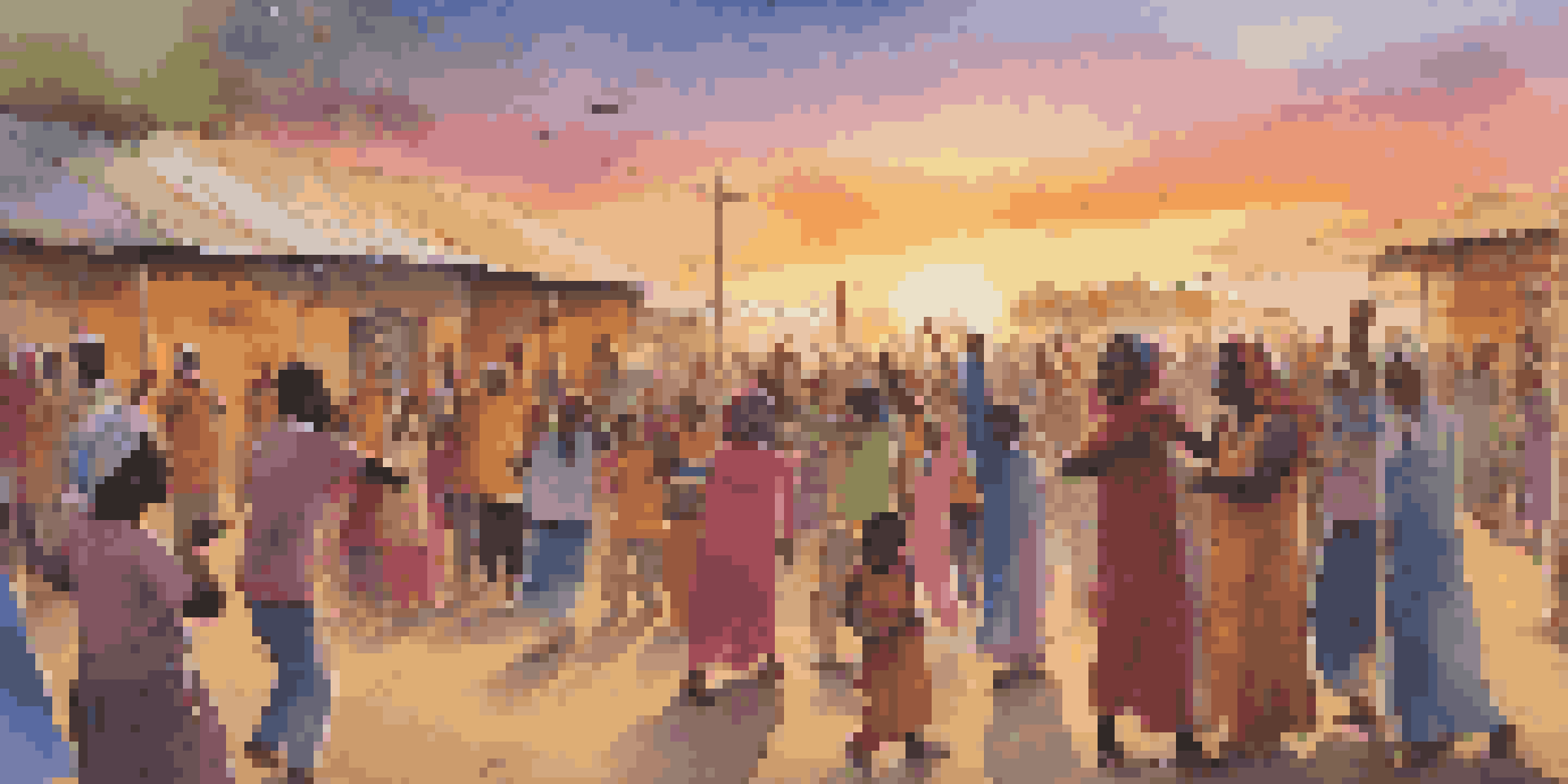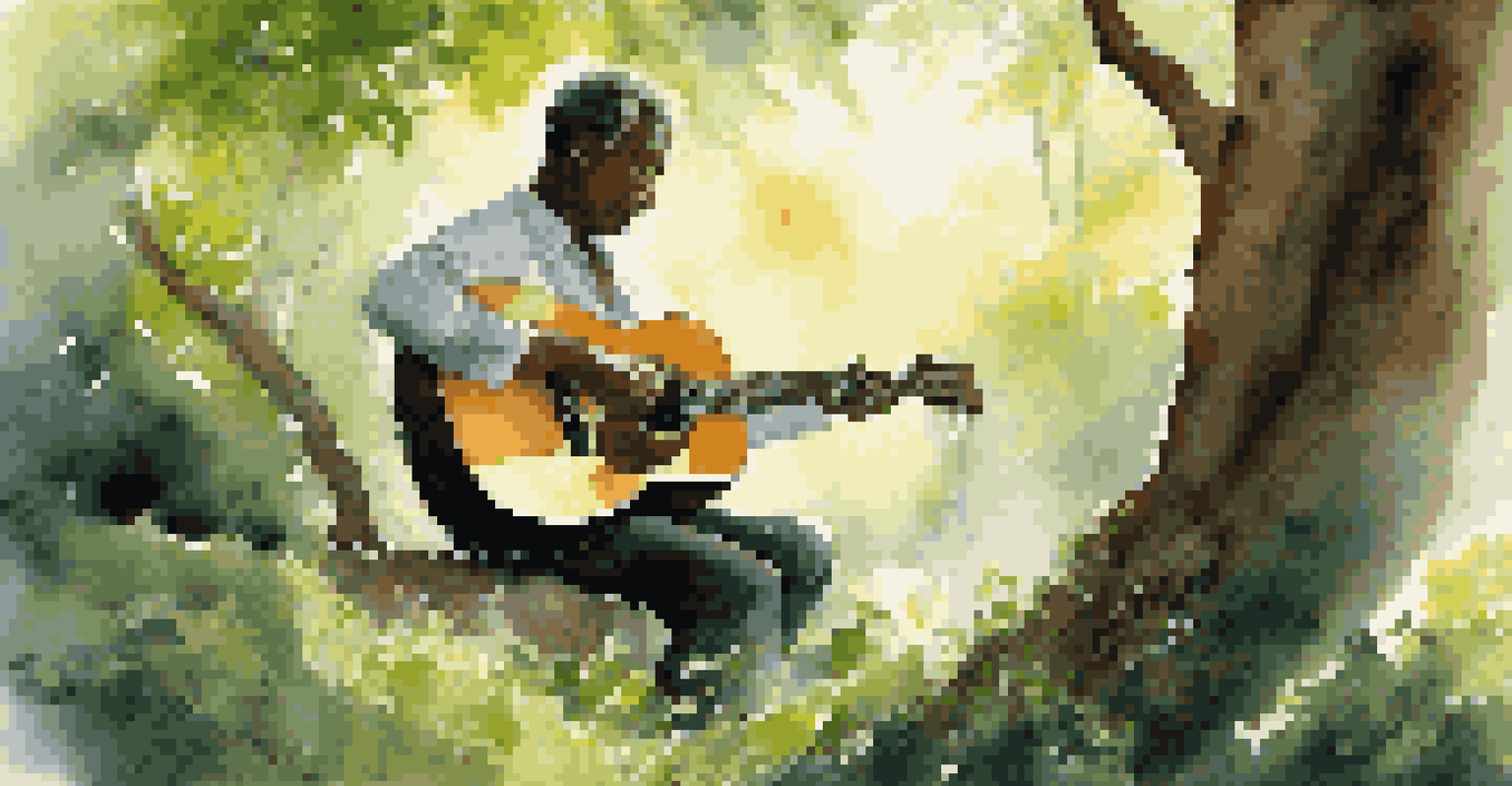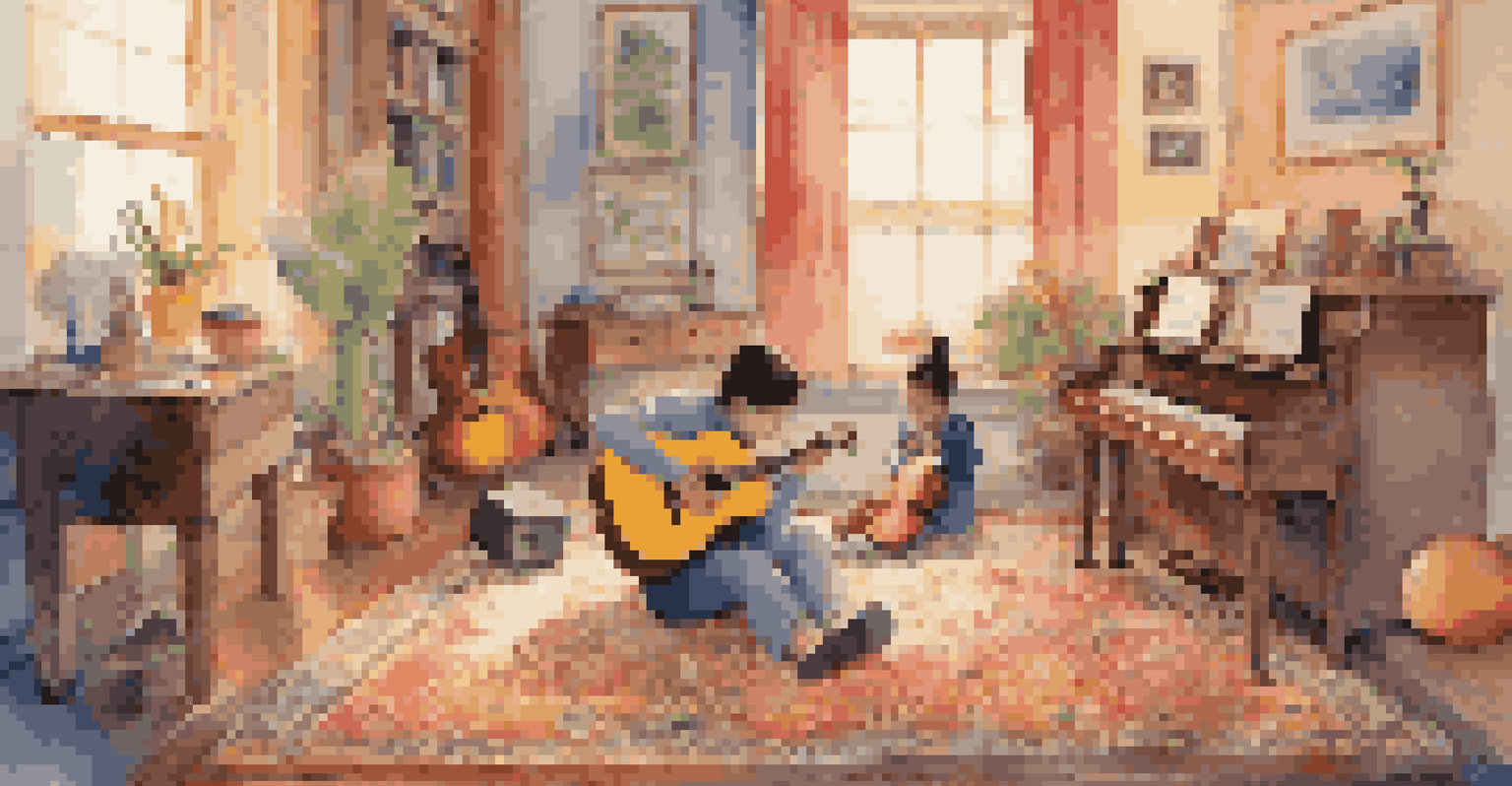Music and Memory: Healing Through Song in War-torn Areas

The Power of Music in Healing Trauma
Music possesses a unique ability to evoke emotions and memories, making it a powerful tool for healing. In war-torn areas, where trauma is often a daily reality, music can provide solace and a means of expression. Research shows that listening to or creating music can reduce stress levels and promote feelings of safety among individuals suffering from post-traumatic stress.
Music can change the world because it can change people.
For example, community gatherings where people share songs can foster a sense of belonging and connection. This communal aspect of music helps individuals feel less isolated in their pain. Just as a familiar song can transport us to a cherished memory, it can also transport those in conflict zones to moments of peace and joy.
When music becomes a part of recovery, it can lead to profound changes in mental health. The simple act of singing or playing an instrument may become a lifeline for those grappling with the aftermath of conflict, showing that even in the darkest times, there is hope for healing.
Music as a Tool for Memory Recovery
In the chaos of war, memories can become fragmented and difficult to access. Music serves as a bridge to these lost memories, offering a familiar soundtrack that can unlock feelings and experiences buried deep within. Songs tied to specific moments can trigger vivid recollections, helping individuals reclaim parts of their identity that trauma may have obscured.

Consider how a particular song might remind someone of a family gathering or a moment of joy before conflict erupted. These auditory cues can reignite connections to happier times, playing a crucial role in the healing process. The act of reminiscing through music not only aids memory recovery but also reinforces personal narratives that may have been shattered.
Music Heals Trauma and Builds Community
Music serves as a powerful tool for healing trauma by fostering connection and providing solace in conflict-affected areas.
As communities work to rebuild after conflict, music can be a shared language that fosters collective memory. This communal remembrance can serve to strengthen bonds among individuals, reminding them of their shared experiences and resilience in the face of adversity.
Case Studies: Music Initiatives in Conflict Zones
Various organizations have recognized the impact of music in healing, leading to initiatives that focus on music therapy in conflict-affected areas. Programs like 'Music for Life' in refugee camps bring together children and adults through song and dance, creating safe spaces for expression and connection. Such initiatives not only provide therapeutic benefits but also encourage a sense of agency and empowerment among participants.
Where words fail, music speaks.
One notable example is the work done by the non-profit organization Musicians Without Borders, which provides music training and workshops in war-torn regions. By nurturing local musicians and creating opportunities for performance, they help communities unite through music while addressing trauma collectively. These grassroots efforts illustrate the transformative power of music in rebuilding lives.
These case studies highlight how music can serve as a beacon of hope, demonstrating that even amidst despair, creativity can flourish. By investing in music initiatives, communities affected by war can reclaim their narratives and foster resilience through shared musical experiences.
The Role of Traditional Music in Healing
Traditional music often holds cultural significance and plays a crucial role in healing practices around the world. In many societies, songs are used during rituals and ceremonies to mark important life events, including healing from trauma. This deeply rooted connection to heritage can provide comfort and a sense of identity for individuals affected by conflict.
For instance, in some African cultures, traditional drumming and singing are integral to community healing ceremonies. These practices not only honor collective grief but also celebrate survival and resilience. Such cultural expressions can unite individuals in shared experiences, highlighting the importance of preserving these musical traditions in the face of adversity.
Traditional Music Preserves Identity
Integrating traditional music into healing practices helps individuals reconnect with their cultural heritage and promotes resilience.
By integrating traditional music into healing practices, communities can foster a deeper understanding of their history and resilience. This blend of cultural heritage and healing can strengthen community ties, emphasizing that music is not just an art form but a vital lifeline in times of crisis.
Music Therapy: Professional Support for Healing
Music therapy has emerged as a recognized form of treatment, particularly for those dealing with trauma in conflict zones. Trained music therapists use a variety of musical techniques to help individuals express their feelings, process experiences, and develop coping strategies. This professional support can be particularly beneficial for children and adults grappling with the emotional fallout of war.
Through guided sessions, individuals might engage in songwriting, improvisation, or simply listening to music that resonates with their experiences. These therapeutic approaches can foster a safe environment where participants feel empowered to confront their emotions. The therapeutic bond formed between the therapist and the client can also provide a sense of safety, essential for effective healing.
As the field of music therapy continues to grow, its applications in conflict zones offer hope for many seeking recovery. The integration of music therapy into mental health care can be a game changer, providing accessible and effective support for those impacted by war.
Creating Safe Spaces Through Music
Safe spaces are essential for individuals in war-torn areas, serving as havens for healing and self-expression. Music can play a pivotal role in creating these environments, where people can gather to share their stories and experiences through song. Such spaces not only allow for emotional release but also help rebuild a sense of community.
In many cases, local musicians and community leaders collaborate to organize music events that foster connection and support. These gatherings can include open mic nights, community concerts, or group singing sessions, all designed to encourage participation and collaboration. By bringing people together, music becomes a vehicle for healing and renewal.
Music Therapy Supports Emotional Recovery
Professional music therapy offers structured support for trauma recovery, enabling individuals to express their feelings and develop coping strategies.
Establishing safe spaces through music not only addresses immediate emotional needs but also contributes to long-term community resilience. As individuals come together to share their voices, they reinforce bonds that can help them navigate the challenges of rebuilding their lives after conflict.
The Future of Music in Conflict Resolution
Looking ahead, the role of music in conflict resolution and healing is becoming increasingly recognized by policymakers and organizations. As more evidence emerges about the therapeutic effects of music, there is a growing push to integrate it into peace-building initiatives. This approach acknowledges the need for creative solutions to promote understanding and healing in post-conflict societies.
For example, collaborative musical projects that bring together diverse groups from opposing sides can foster dialogue and empathy. By engaging in shared artistic experiences, individuals can break down barriers and challenge preconceived notions about one another. This transformative potential of music can lead to greater social cohesion and understanding.

As we envision a future where music is utilized as a tool for conflict resolution, it’s essential to support and invest in these initiatives. By embracing the healing power of music, we can pave the way for a more harmonious and resilient world, even in the wake of conflict.